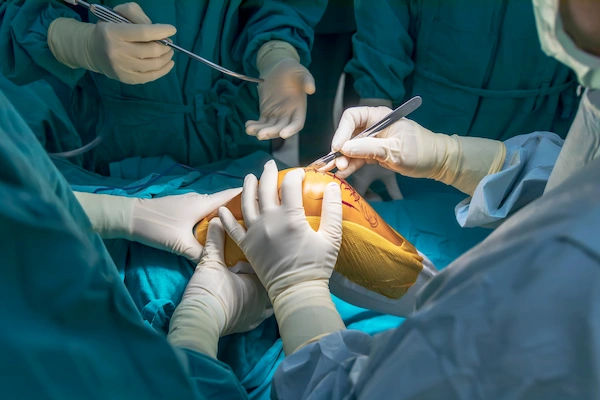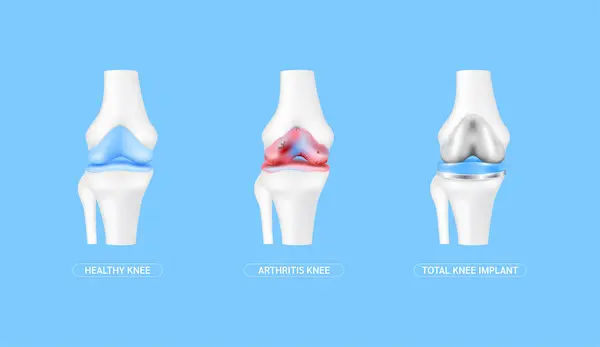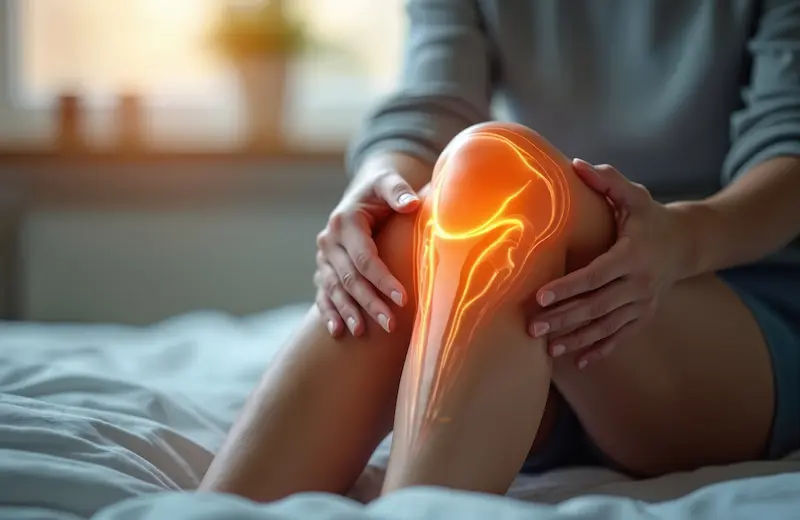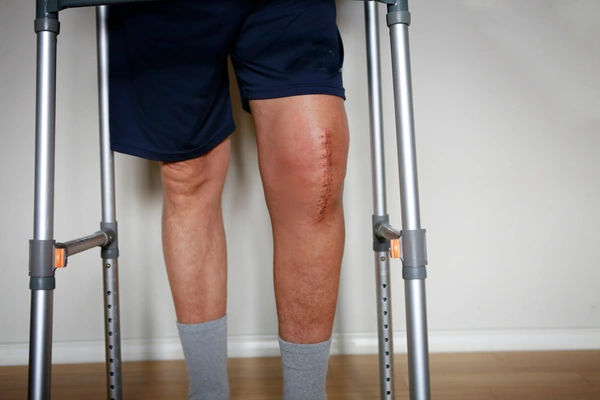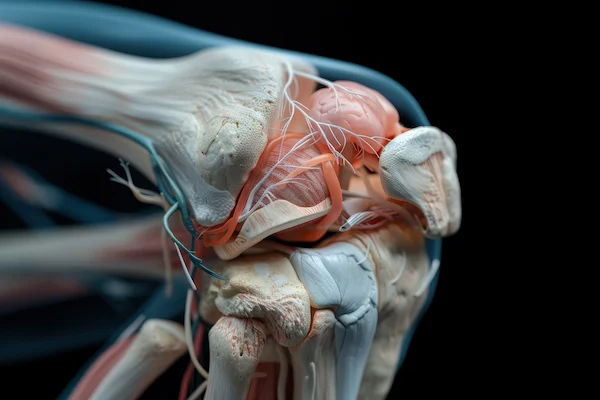Guide to Knee Replacement Not Only Surgical Option Patients Knee Arthritis
Explore knee arthritis care beyond surgery. Learn about non-surgical treatments, minimally invasive procedures, and when knee replacement is necessary to make informed choices.

Written by Dr. Rohinipriyanka Pondugula
Reviewed by Dr. M L Ezhilarasan MBBS
Last updated on 13th Jan, 2026

Introduction: Understanding the Full Spectrum of Knee Arthritis Care
If persistent knee pain from arthritis is limiting your daily life, you may have started considering knee replacement
surgery. It is a common thought, particularly when simple activities such as walking or climbing stairs become difficult.
However, total knee replacement is far from the only option, and in many cases, it is not the first treatment to consider.
This guide will help you understand the full spectrum of knee arthritis care. You will learn about effective non-surgical
treatments and minimally invasive procedures that can provide significant relief, potentially delaying or avoiding major
surgery. The goal is to ensure you are fully informed, empowering you to discuss the best treatment plan with your
healthcare provider.
What is Knee Osteoarthritis? The Root of the Problem
Knee osteoarthritis is the most common form of arthritis and is often described as "wear-and-tear" arthritis. It occurs
when the protective cartilage cushioning your bones wears down over time. Cartilage loss leads to pain, stiffness,
swelling, and reduced joint movement. In advanced stages, bones may rub together, causing intense discomfort.
Symptoms That Signal It's Time to Seek Help
Key indicators of osteoarthritis include:
- Pain that worsens with activity and eases with rest
- Morning stiffness or stiffness after periods of inactivity
- Swelling around the joint
- Grating sensation or sound (crepitus) when moving the knee
- Decreased mobility, making it difficult to fully straighten or bend the knee
If these symptoms persist, consult a doctor for an accurate diagnosis. Apollo24|7 offers online consultations for initial
evaluation and guidance.
Consult Top Doctors for Your Symptoms
The Conservative Path: Comprehensive Non-Surgical Management
Non-surgical options are usually the first line of treatment. They can effectively manage pain and improve function for
months or years.
A. Lifestyle Modifications: The First Line of Defence
Simple daily changes can significantly impact knee pain.
1. Weight Management: Easing the Load on Your Knees
Every extra pound of body weight adds around four pounds of pressure to your knees. Even modest weight loss can
reduce stress on your joints significantly.
2. Low-Impact Exercise: Strengthening Without Strain
Rest can worsen stiffness. Low-impact activities such as swimming, cycling, and walking strengthen the muscles
supporting your knees. Exercises targeting the quadriceps and hamstrings act as natural shock absorbers.
B. Physical Therapy: Building Strength and Improving Mobility
A physical therapist can create a personalised exercise plan to improve flexibility, strengthen muscles, and correct gait
imbalances. Techniques like ultrasound or manual therapy may also help reduce pain and inflammation.
C. Medications and Injections: Managing Pain and Inflammation
When lifestyle changes and physical therapy are not enough to control pain, medications and injections can play a key
role in reducing inflammation and improving knee function.
1. Oral Medications (NSAIDs, Acetaminophen)
Nonsteroidal anti-inflammatory drugs (NSAIDs) such as ibuprofen reduce pain and inflammation. Acetaminophen
helps with pain but does not address inflammation.
2. Corticosteroid Injections: Powerful Short-Term Relief
These injections deliver strong anti-inflammatory medication directly into the knee joint, providing rapid relief for
several months. They are useful for flare-ups but are not recommended for long-term use.
3. Hyaluronic Acid Injections (Viscosupplementation)
Hyaluronic acid supplements the knee’s natural lubricating fluid, sometimes providing longer-lasting relief than
corticosteroid shots. Effectiveness varies between patients.
Minimally Invasive Procedures: Bridging the Gap
When conservative measures are insufficient, but surgery seems premature, minimally invasive procedures can be
considered.
1. Arthroscopic Surgery: Not for Typical Arthritis
Arthroscopy uses a small camera and instruments through tiny incisions. It is effective for treating torn meniscus or loose bodies but offers limited benefit for typical osteoarthritis compared with physical therapy and medications.
2. Genicular Artery Embolisation (GAE): An Emerging Option
GAE is a new, minimally invasive procedure performed by an interventional radiologist. It blocks abnormal blood
vessels that cause inflammation and pain in the knee. Early studies show promising results with short recovery times,
though long-term data are still being collected.
When is Knee Replacement Surgery the Right Choice?
Surgery may become necessary under the following conditions:
- Severe pain that affects sleep and daily activities
- Significant disability impacting mobility and routine tasks
- Failed conservative treatment over several months
- Knee deformity, such as bowing in or out
Signs You May Be a Candidate for Surgery
Good candidates are generally in good health, understand the procedure and recovery process, and have realistic
expectations. Age matters less than the overall impact on quality of life.
Making Your Decision: A Collaborative Approach with Your Doctor
Deciding on surgery is a significant step and should be made collaboratively with your orthopaedic specialist. Discuss
your pain, functional goals, and the risks and benefits of all options. Ask about success rates and recovery expectations
to make an informed choice.
Conclusion: Empowering Your Journey to Knee Health
Living with knee arthritis can be challenging, but multiple treatment paths exist. Conservative non-surgical measures
can often relieve pain and improve function. Minimally invasive procedures provide intermediate options, while surgery
remains a choice for advanced cases.
By understanding the full spectrum of care, you can actively participate in decisions about your knee health. If
symptoms persist or concerns remain, book a physical consultation with an orthopaedic specialist through Apollo24|7
for a comprehensive evaluation and personalised care plan. Proactive steps today can lead to a more active and pain-
free tomorrow.
Consult Top Orthopaedicians
Consult Top Orthopaedicians

Dr. Anil Pradeep Jadhav
Orthopaedician
23 Years • MBBS MS (Ortho)
Nashik
Apollo Hospitals Nashik, Nashik
(25+ Patients)

Dr. Padam Singh Gautam
General Physician/ Internal Medicine Specialist
43 Years • M.B.B.S (WARDHA M. S.), F.A.G.E. (MANIPAL), F.A.I.M.S. (Pb.), M.A.I.M.S. (Pb.), M.R.S.H. (LONDON)
Noida
Dr Padam Singh Gautam Fracture Clinic, Noida

Dr. Suraj Prakash
Orthopaedician
5 Years • MBBS, MS (Ortho)
Bengaluru
Apollo Clinic, Indiranagar, Bengaluru

Dr. Susheel B
Orthopaedician
13 Years • MBBS, MS, Ortho Fellowship in Trauma ( Germany) Fellowship in Arthroscopy and Arthroplasty ( Switzerland)
Bengaluru
Apollo Medical Center, Marathahalli, Bengaluru

Prof. Dr. Jambu N
Orthopaedician
23 Years • MBBS, M.S Ortho, FRCS ,FACS
Chennai
Apollo Speciality Hospitals Vanagaram, Chennai
(150+ Patients)
Consult Top Doctors for Your Symptoms

Dr. Anil Pradeep Jadhav
Orthopaedician
23 Years • MBBS MS (Ortho)
Nashik
Apollo Hospitals Nashik, Nashik
(25+ Patients)

Dr. Padam Singh Gautam
General Physician/ Internal Medicine Specialist
43 Years • M.B.B.S (WARDHA M. S.), F.A.G.E. (MANIPAL), F.A.I.M.S. (Pb.), M.A.I.M.S. (Pb.), M.R.S.H. (LONDON)
Noida
Dr Padam Singh Gautam Fracture Clinic, Noida

Dr. Suraj Prakash
Orthopaedician
5 Years • MBBS, MS (Ortho)
Bengaluru
Apollo Clinic, Indiranagar, Bengaluru

Dr. Susheel B
Orthopaedician
13 Years • MBBS, MS, Ortho Fellowship in Trauma ( Germany) Fellowship in Arthroscopy and Arthroplasty ( Switzerland)
Bengaluru
Apollo Medical Center, Marathahalli, Bengaluru

Prof. Dr. Jambu N
Orthopaedician
23 Years • MBBS, M.S Ortho, FRCS ,FACS
Chennai
Apollo Speciality Hospitals Vanagaram, Chennai
(150+ Patients)
More articles from Total Knee Replacement
Frequently Asked Questions
Q1. What is the most effective non-surgical treatment for knee osteoarthritis?
There is no single treatment. A combination of weight management and guided physical therapy typically provides the most sustainable long-term benefits.
Q2. Can I avoid knee replacement surgery by losing weight?
In many cases, yes. Weight loss can reduce pain and improve function, potentially delaying or preventing the need for surgery.
Q3. How long do hyaluronic acid injections last?
Relief can last six months to a year, depending on the individual. A typical course involves multiple injections over several weeks.
Q4. Is walking good for arthritic knees?
Yes. Walking is a low-impact exercise that keeps joints lubricated and strengthens supporting muscles, provided it does not cause severe pain.
Q5. At what stage of arthritis should you consider surgery?
Surgery is considered when arthritis significantly affects quality of life, causing severe pain, major mobility limitations, and failure of non-surgical treatments.
